February 5th 2023, Riobamba.
Leaving Guayaquil was a relief, to be honest. I had done next to no biking in the previous 10 days and I was beginning to feel guilty. Yes, I had gone from the city down to the coast and spent two days at a resort named Playas. But that was to hideaway and write, and I had not moved about or really explored the area. And, yes again, I had gone to the Galapagos Islands for six days but I had to leave the bike behind (of course I had — the islands are 900 kms out into the Pacific) and so I wasn’t moving forward on the trip. I don’t regret going to the islands. I think I would have regretted it forever more had I not gone, and I don’t think friends back home would have understood being so close to such an extraordinary place and not visiting it. Being on the islands made we acutely aware of being on my own, and not particularly liking it. I missed Moira a lot, partly because I knew she would have loved to be there. The wildlife, the colours and the beautiful beaches would have appealed to her and every time I saw them, I was aware she was not seeing them with me and I felt bad about that. So, one night back in Guayaquil and a good sleep in the hostel Casa Michael, and I was more than ready to hit the road again.
It was Sunday and so getting out of the city was a cinch, made all the easier by Google maps and the GPS function on my phone. I had to navigate across part of the city, around the airport and through several major junctions with multi-lane flyovers and roundabouts with multiple exit options but it’s hard to get lost with that little blue circle telling you where you are. . . Once outside the city, I decided to head up through the center of the country but not on Highway 35, the main route to Quito. I opted instead for the 487, which runs more or less parallel to it and, as it happens, is the Panamericana, as opposed to the better, more modern road.
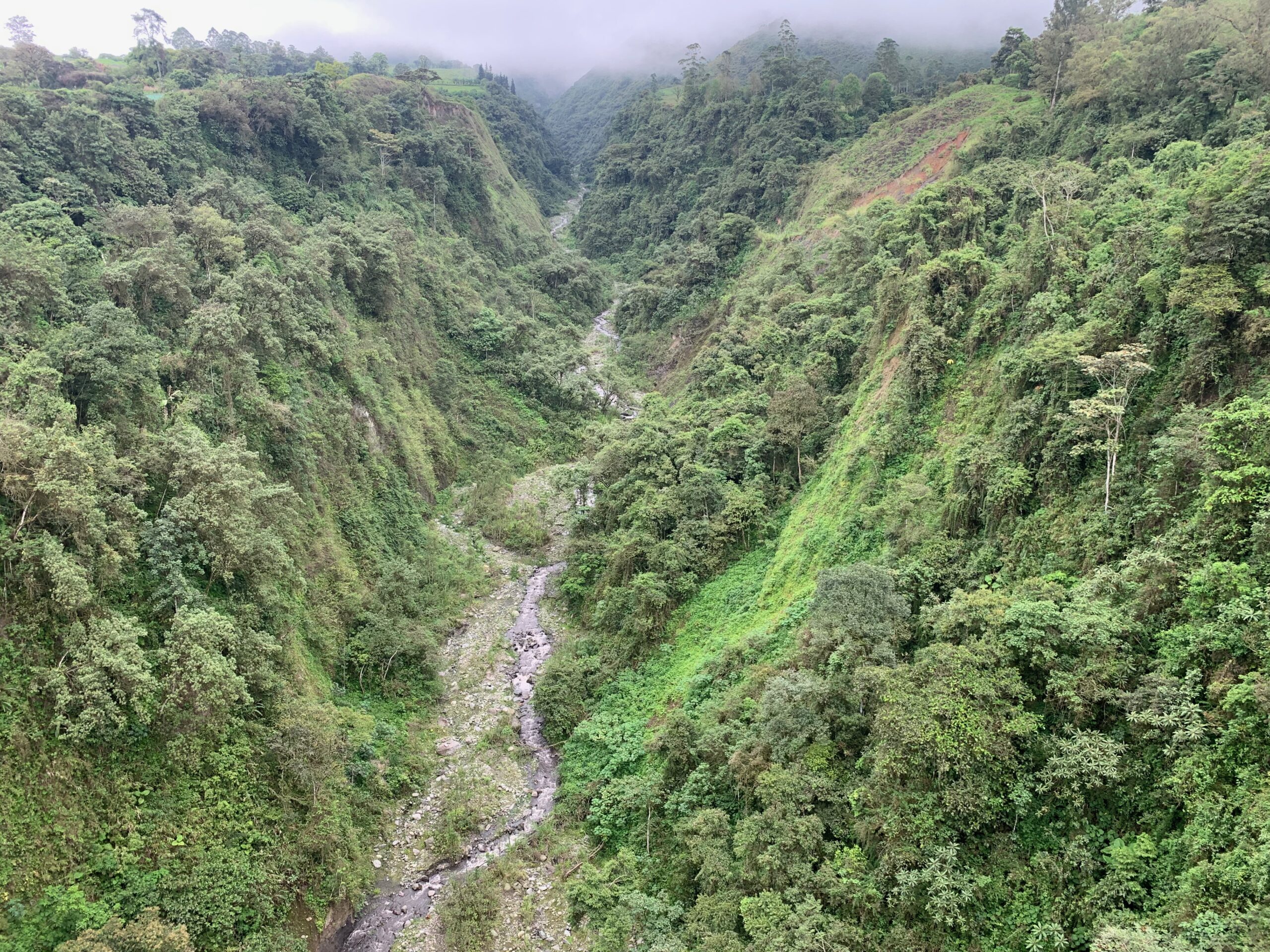
The landscape gradually became more jungle-like.
The countryside was getting more and more tropical as I moved north, with banana and cacao plantations giving way to greater varieties of vegetables, lush green fields and, upland, dense forests of trees and tall plants, some of them with the sort of giant leaves one associates with the tropics. But it was an uneventful run until the junction at which the two roads converged, a few kilometers south of the city of Riobamba.
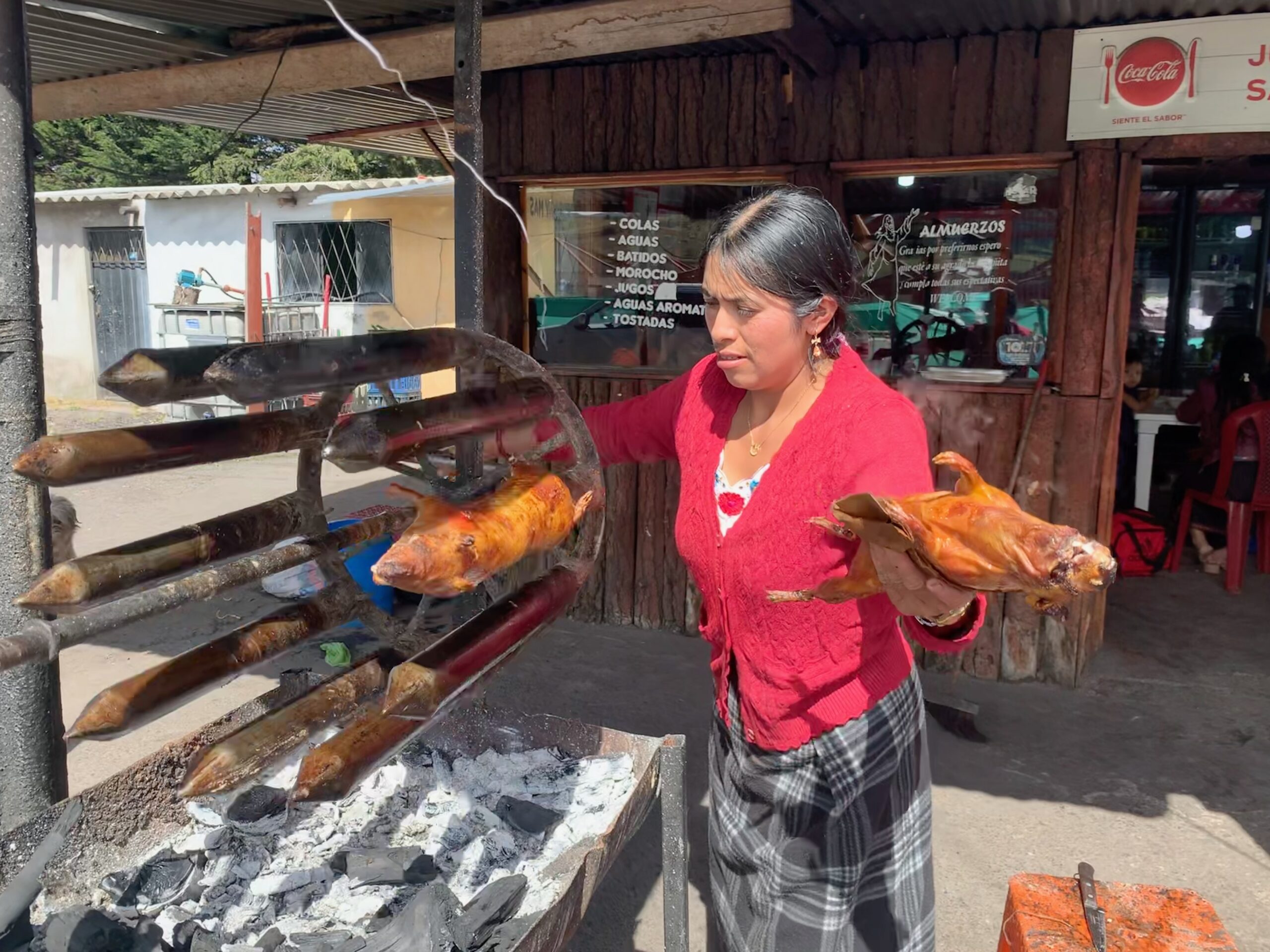
Cuj -- bar-b-queued Guinea Pigs -- ready for serving.
Along one side of the road for perhaps 100 meters, there were bar-b-queue braziers, all in a line, one after the other, each with roasting spit wheels turning above the embers. And on the spits were . . . Cuj, pronounced Koo-ee — that is to say roasting Guinea Pigs. I have a deep aversion to rejecting any food without trying it at least once. But I have not been able to summon up the courage to order Guinea Pig in any restaurant and I’ve seen the option regularly since early in southern Peru. In fact, oftentimes one enters a room at the rear of a country hostel or a restaurant, usually the bathroom, only to provoke a chorus of excited squeaking from somewhere further out back, a shed or garden compound. The first time I heard it, I knew immediately it was a small herd of Guinea Pigs destined one day for the kitchen.
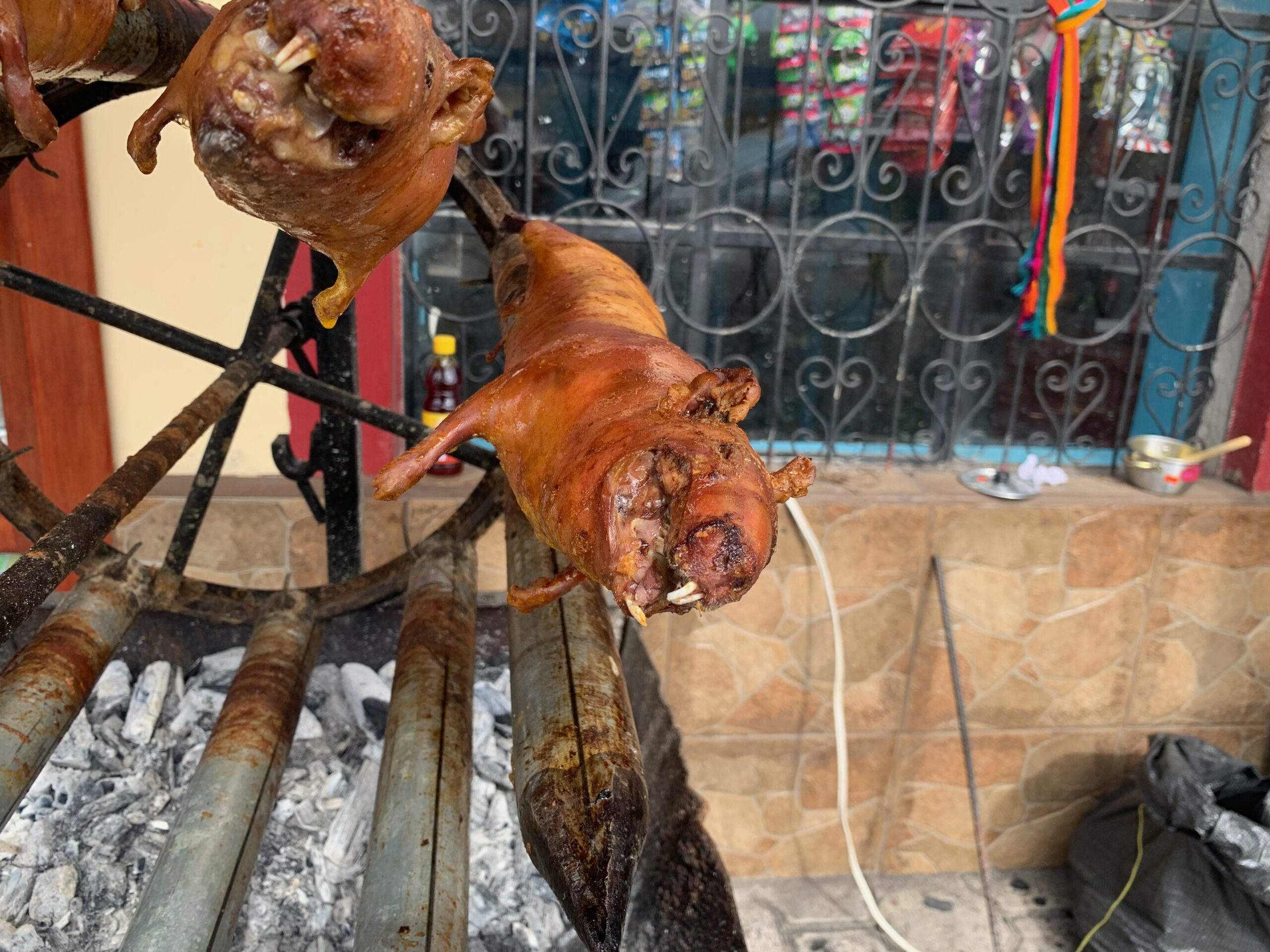
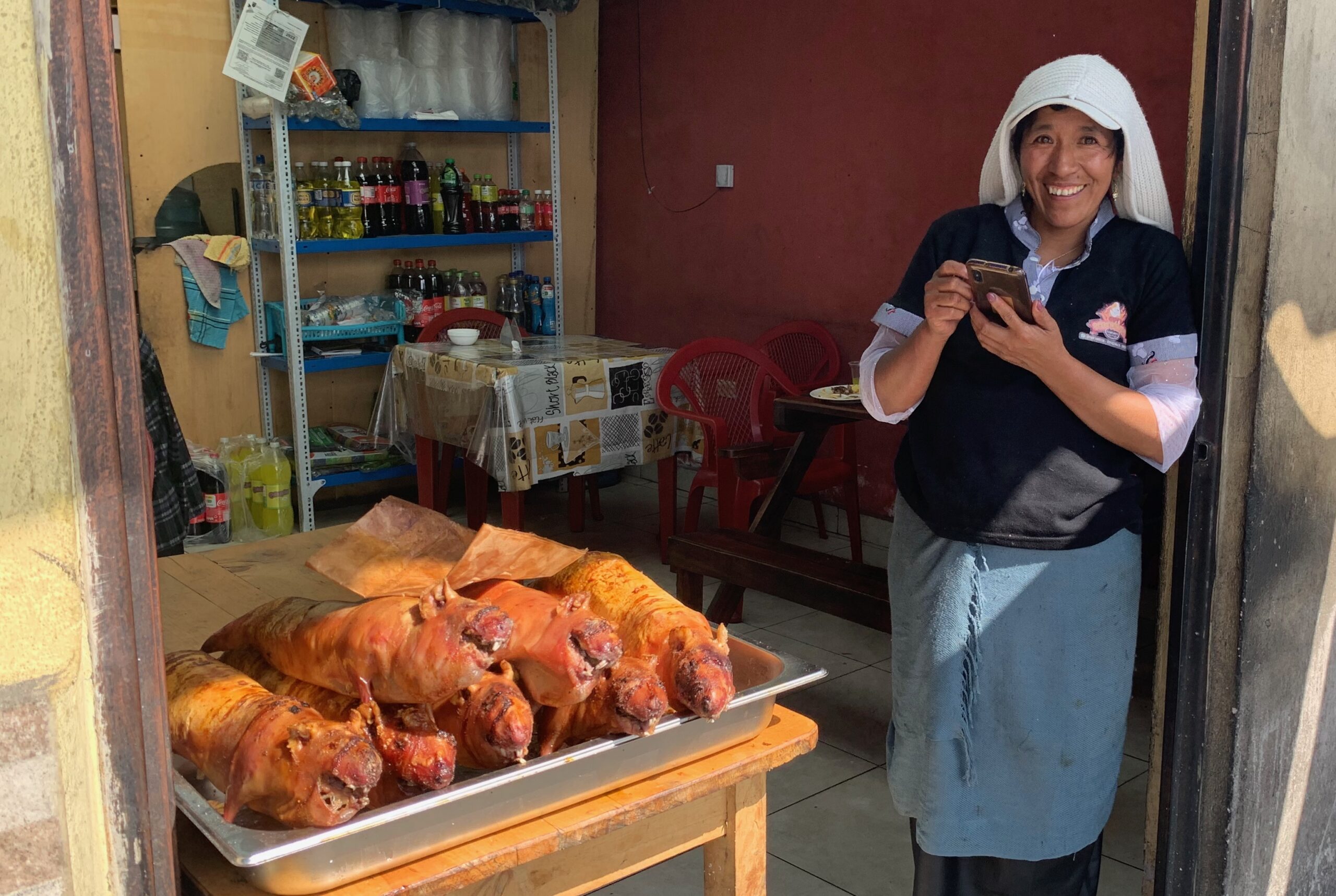
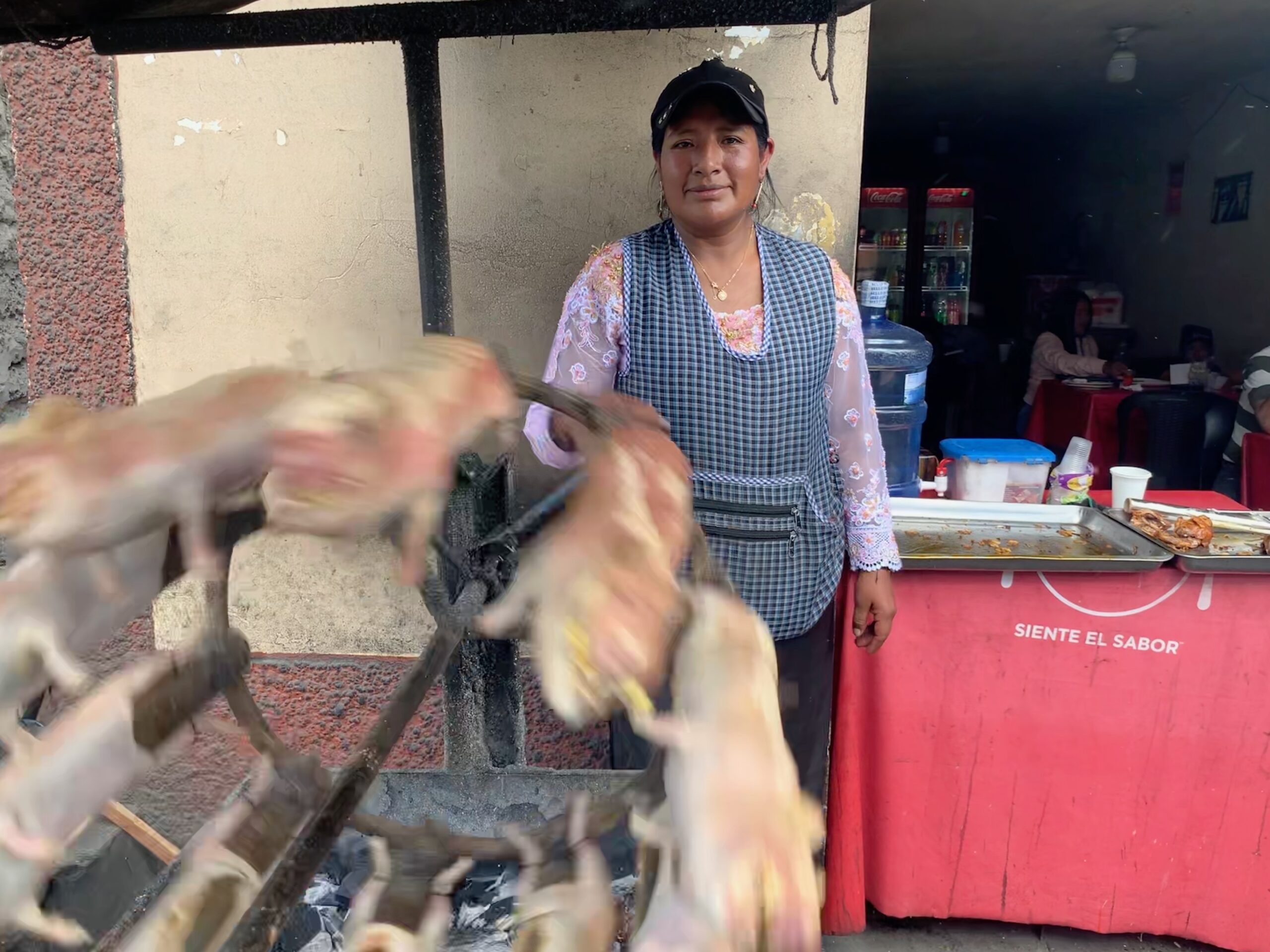
Most of the bar-b-queues, which are all attached to restaurants behind them and sporting names like La Casa Del Cuy, have two spit wheels. One will have nearly ready-to-serve Guinea Pigs, all golden brown and glistening from regular basting with oil. Efforts to sell to passers-by from this spit become more and more urgent as time drags on and the dinner starts to look a tad burnt. The other spit will replace the first when it is sold out, meaning that this spit has 10 little pink fleshed Guinea Pigs on it, and they look even less appetising than the others.
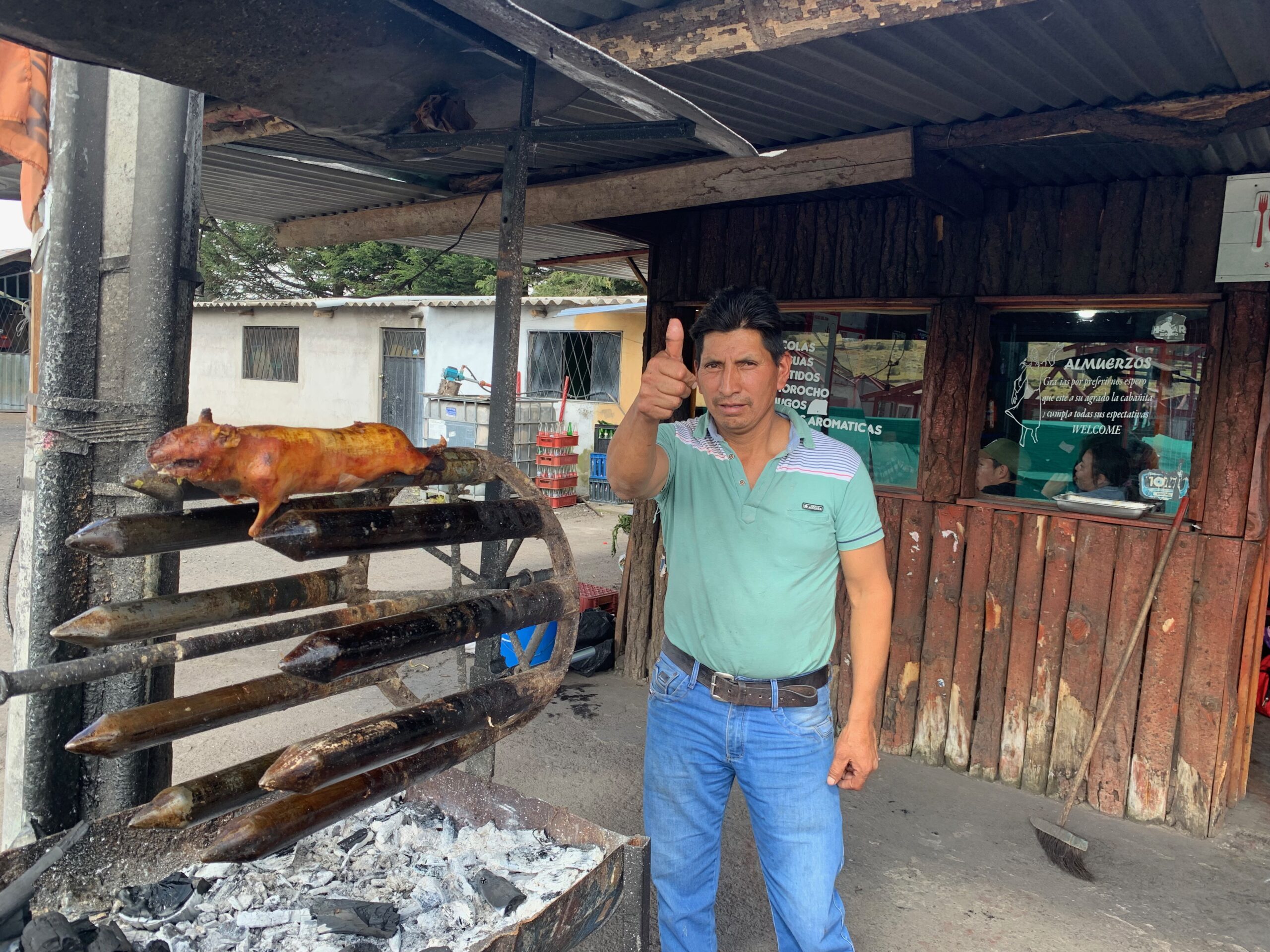
A typical Ecuadoran dish and in high demand too.
I’m always a little apprehensive photographing people doing traditional things, or wearing traditional clothes, without asking first, lest I be thought of as “oh here’s another gringo poking fun at us”, which is not an unreasonable reaction for people to have at times. And so I ask and usually the answer is yes. Well, the Guinea Pig ladies were all up for it! They loved my interest and we chatted as best we could.
“Si,” said one lady to my question, “es especial y tipica de la comida de Ecuador.”
Would I like some, she gestured. Thanks darling but I’ll pass on that, I gestured back smiling. She laughed.
Inside the restaurants, families were munching away happily and I got the impression that the meal was something of a treat — the occasion being wrapped up with the fact that this was Sunday and also polling day.
I don’t know how the Guinea Pigs are killed before they are roasted. A lady roaster told me they take four to five months to grow — a short enough life for the little squeakers. Cooked, they were being sold — and there were lots of takers, both for eating there and also cars pulling in for takeaway — for $10 each.
Earlier in the day, I had noticed huge queues at polling stations — queues like the ones you see at some US elections, or years ago in South Africa. People seemed to be taking their civil duty very seriously and there was a lot of colour and pageantry, young women in traditional dresses making a day of it. At the junction where the roads met, there was all this and more. After the Guinea Pig episode, a little further on, at the town of Villa La Union, the polling station was right beside the road and so I decided to have a look.
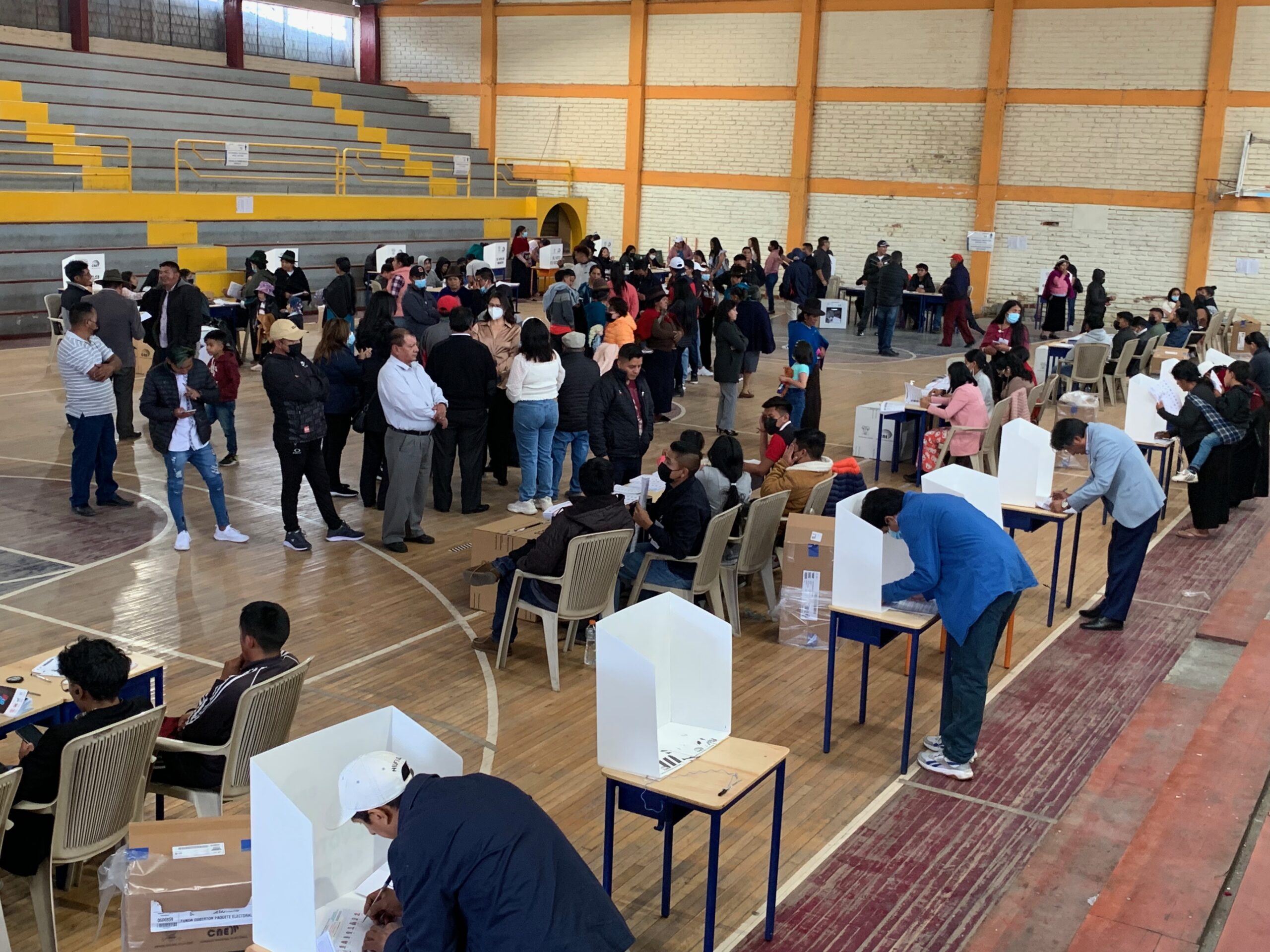
Last minute voting in the local sports hall.
There were no restrictions to walking inside, perhaps because it was nearing 5pm and the election was all but over. It was funny how the inside looked so much like the inside of a large Irish polling station or a count center — officials at desks doing their work but lots of other people, political junkies, milling about chatting, speculating on the result.
(A couple of things surprised me about the elections, which have been going on for several days in different parts of the country. The first was the presence of armed soldiers, as well as armed police which you’d have thought was sufficient security, at polling stations. On Saturday when leaving the Galapagos Islands, voting had ended and sealed ballot boxes were being ferried off San Cristobal, to where I know not, under the eyes of soldiers armed with rifles and, in one instance, a pump action shotgun. The second, and even more alarming thing, is that for three days until 12 noon the day after polling — that is, from noon on Friday, through all of Saturday and all of Sunday, and right into Monday — there is a complete ban on the sale of alcohol throughout the entire country. You simply cannot buy an alcoholic drink of any kind in any shop anywhere, in any bar, cafe or restaurant. There, the electoral comparisons with Ireland end.)
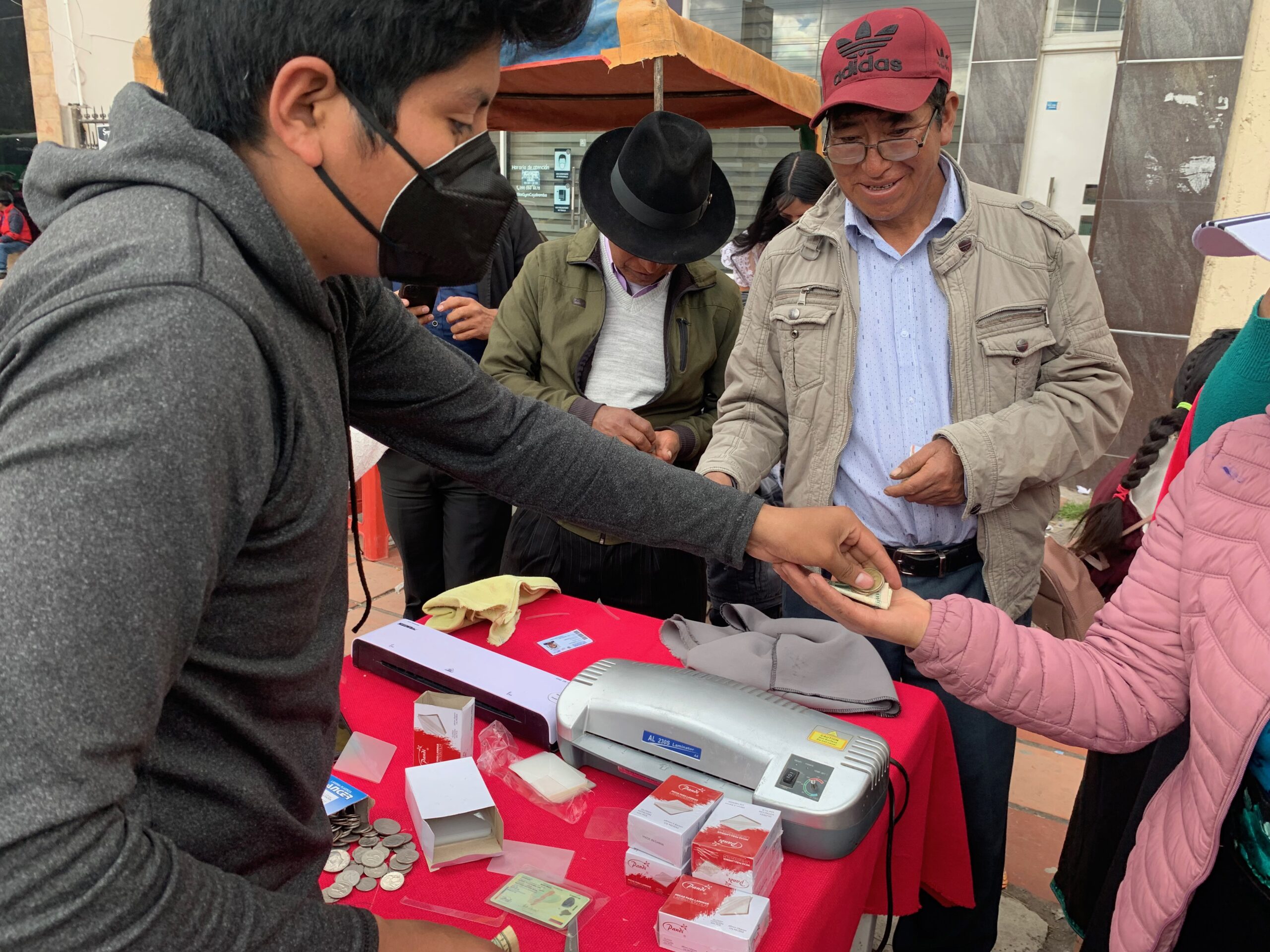
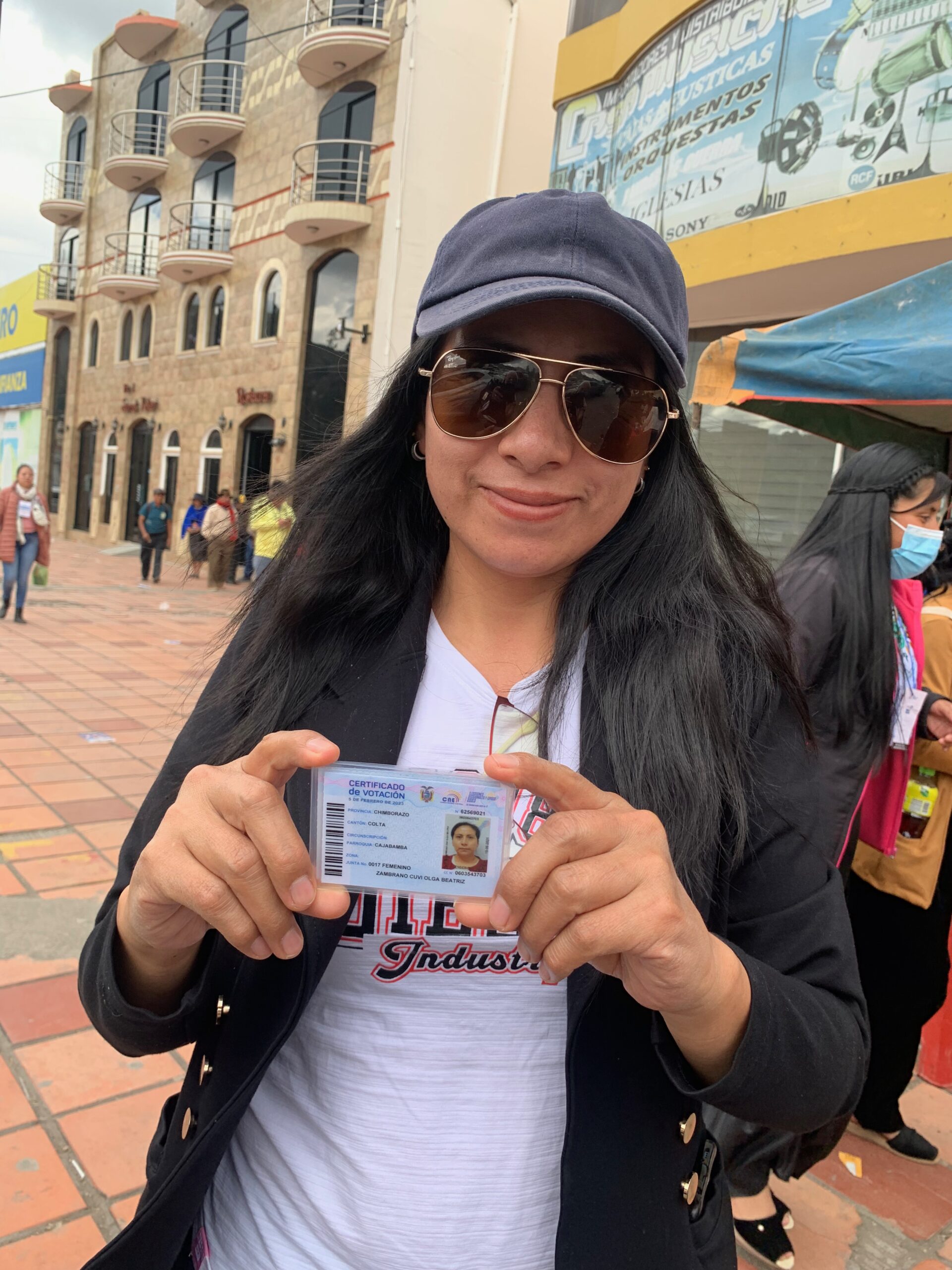
The laminate man doing brisk trade and one voter with her proof of having done so, as required by law.
Outside the Villa La Union polling station, everyone who left, having voted, approached a fellow who had set up a desk on the footpath and was armed with a laminating machine and tiny credit card-sized see-thru envelopes. Voters came to him with slips of paper and paid him 50 cents to put the slips of paper inside, and then laminate them sealed. It took a while to work it out, conversing with the enterprising laminater and police (who were much more interested in my bike than my inane questioning about Ecuadoran electoral procedures), that the slips of paper, which had a photo of the bearer and their name, certified that they had in fact voted at the election. Voters were having their certs laminated for safe keeping in case they were ever asked to prove that they had indeed voted.
“Es obligatorio to vote?” I asked the senior policeman.
“Si, es obligatorio,” he replied, but quickly changed the subject back to the bike and why I was on my own. “Por qué viajas solo en moto?”
“Por qué no?” I said, adding by way of explanation: “I have good wife.”
And he laughed.
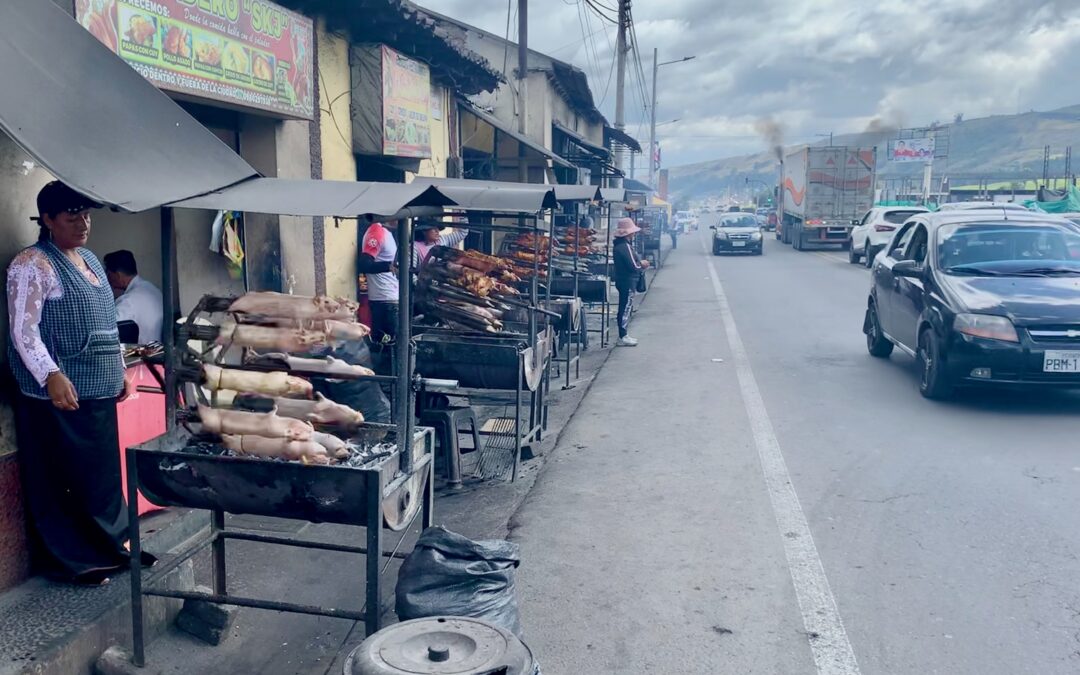
Yes Peter—the most important item in a biker’s toolkit—an understanding partner??
I’ll tell her you said that! But yes, you are correct!
Thanks Peter, most interesting. Reminds me of some years back en route to Buenos Aires our flight was diverted to Paraguay at about 3am local time. Within 45 minutes we the passengers were surrounded by local hawkers/traders selling their wares, including cooked ?…. interestingly there was no toilet paper in the loo, I shared my Irish newspaper……!
Thanks John. You’ll be interested to know that the loo poll situation has not changed since you were in these parts. I carry several rolls with me at all times…. And of course, you cannot flush the used paper down the pan. Bathrooms are quite the place hereabouts!
A great read, Peter. It’s all SO interesting. I wonder what the punishment is for NOT voting??
Guinea Pig for dinner?
Your journey looks more interesting every time I read it.
Several bikers I mentioned your journey are now following you.
Most were from my local gym which Maureen forces me to and it beats exercising talking!
Take care
Serves you right! Thanks for recommending me to ours pals. Am in northern Colombia now buit prob won’t enter Venezuela. Next big challenge is getting over the Darien Gap. Your biker pals will know about that one! Love to you both….